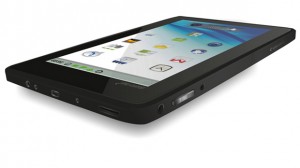A tablet, touted as the world’s cheapest, designed and developed by a Canadian-run company with operations in Montreal? Who knew? Now priced at around $40, the product is called the Aakash and it’s heading into version 3.0. Datawind, the company that produces it, has ambitions to bring the price down even further to around $25. Their company slogan is: “Bridging the digital divide” and now that they have the largest market share of tablets in India, the world’s second most populous nation, they may just be living up to it. In order to bring low-cost internet to developing markets, Datawind has patented a process that uses a proxy server between a portable device and an internet service provider’s server to reduce the volume of data that get transmitted over the web. This process shortens the time users wait to view a webpage, which is especially useful in developing countries where internet access is often slow and expensive.
I had a chance to speak with Derek Kopke, a McGill alumni (B. Ed. 1992) who is Datawind’s Executive Vice President of International Business Development. He explained that the Aakash’s popularity took off from the time the company won an Indian government bid in 2010 against 17 competitors to produce a tablet for use in India’ schools that would be subsidized for students. Ever since the Aakash received endorsement by the President of India, Pranab Mukherjee, it’s been a challenge to keep up with demand.
Datawind now has its headquarters in London, England and offices in India but maintains a Research and Development office and a touch screen lab here in Montreal. In an interview given to the Montreal Gazette, Datawind’s Chief Technical Officer Raja Tuli states that the company finds Montreal to be a great location because it possesses “engineering graduates with impressive skills and he’s not sure he would be able to find the same level of expertise in another city.”
I was curious to know what kind of skills his company looks for in new employees. Kopke said that they hire for very specific needs, but he suggests that new engineering graduates gain a basic understanding of how to work with open source software. He sees future growth to be in low-cost and free applications and hardware. For those of you in Computer Science, you may be interested in taking COMP 529: Software Architecture. Last year’s syllabus describes the final project where students learn how to reverse engineer a large open source system. The course will be offered again this winter.
I asked Derek if we can expect to see the Aakash on McGill campus anytime soon. He said Datawind is planning to market their product in North America within the next couple of months. And with that, Derek had to get back to work bringing his tablet to the masses.
Image from Smart Planet

